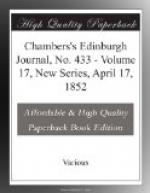in the same manner, without removing the hair.
Though now furnished with the materials for clothing,
they were without the implements necessary for making
them into articles of dress. They had neither
awls for making shoes and boots, nor needles for sewing
their clothes. Their ingenuity was, therefore,
again put to the test, and was not slow in making up
the deficiency. They contrived to make both very
well, out of the bits of iron which they had collected
from time to time. One of their most difficult
tasks, was to make eyes to their needles; but this
they accomplished with the help of their knife; for
having ground it to a very sharp point, and heated
a kind of wire, forged for the purpose, red-hot, they
pierced a hole through one end, and by whetting and
smoothing it on stones, brought the other to a point.
These needles were astonishingly well formed, nothing
being amiss with them but the roughness of the eye,
by which the thread was sometimes cut. It was
indeed surprising that they were so well made, considering
the rude instruments with which they were fashioned.
Having no scissors, they were obliged to cut out their
clothes with the knife; and though this was their
first attempt at the trade of shoemaker or tailor,
yet they contrived to cut out the articles which they
required with as much precision as if they had served
a regular apprenticeship to the business. The
sinews of the reindeer and bears answered for thread.
They set earnestly to their work. For summer wear,
they made a sort of jacket and trousers of the prepared
skins; for winter, long fur-gowns, with hoods, made
after the fashion of those worn by the Laplanders.
The constant employment which their necessities required,
and the various difficulties which they had to overcome
by ingenious contrivance, so far from having been
a misfortune, may be considered as having been the
means of preserving these poor men from sinking under
their unhappy circumstances. But accordingly as
their ingenuity had supplied their wants, and their
minds became more disengaged from expedients, their
melancholy increased, and they looked round despondingly
on the sterile and desolate region where, they felt,
they were to spend the rest of their days, far away
from the hearths of home, and from early friends and
companions. Even the probability of that little
circle being lessened, and, it might be, reduced to
one solitary being, was a dreadful thought: each
felt that this might be his own fate. Then the
fear of all means of sustenance failing, and the assaults
of wild beasts, were dangers too glaring to be forgotten.
Alexis Himkof, who had left a wife and three children,
suffered perhaps the most from heart-yearnings after
home.




